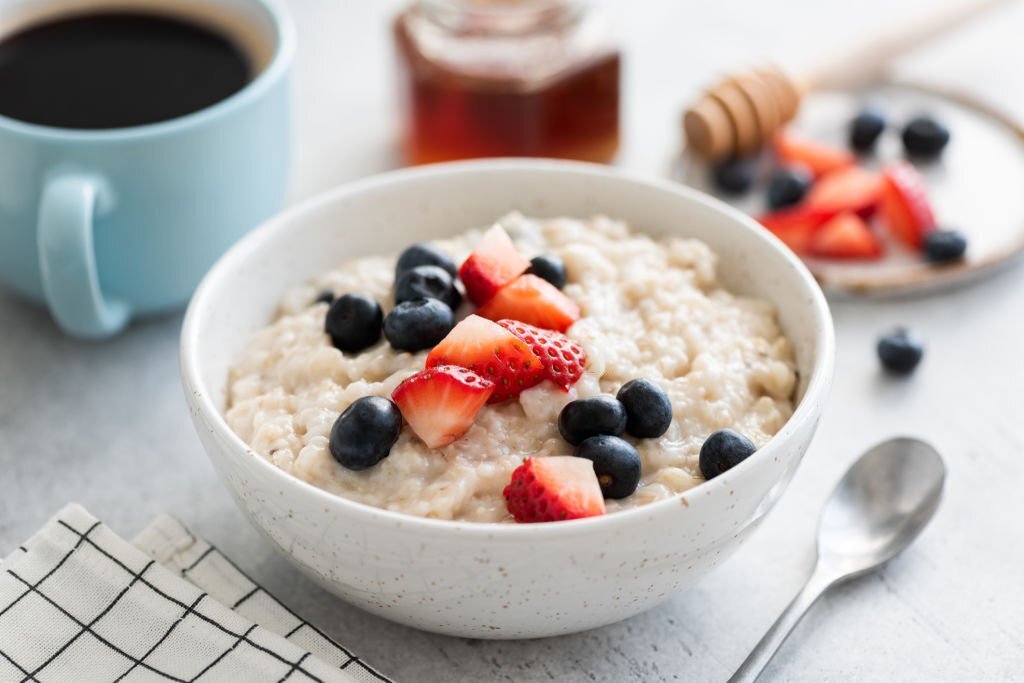Although it is seemingly normal breakfast option, oatmeal is one of the best things you can start your day with. On one hand, it has a reputation for being this bland, gluey slop sprinkled with raisins. However, on the contrary, oatmeal has become more and more popular on social media and video sharing platforms due to the delectable recipes and toppings.
Bob’s red mill oats are also naturally gluten-free and a good source of carbohydrates for people with special dietary needs (like those with celiac disease).
There are different varieties of oats available, especially based on the geographic location and food habits, including:
- Irish Oats or Whole Oat Groats,
- Steel Cut,
- Old-Fashioned/Rolled Scottish Oats,
- Instant Oats,
- Quick Oats,
- Oat Bran, and
- Oat Flour
The kind of oats you eat, or would want to, is a further consideration. You can choose steel-cut, old-fashioned, or rolled oats rather than instant or quick oats to reap the greatest health benefits.
Bob’s Red Mill steel-cut oats are the lowest on the glycemic index, meaning that even though these options have roughly the same amount of fiber, your body will digest them slower, assisting in maintaining stable blood sugar and energy levels.
Why Having Oatmeal a Good Option For Breakfast?
It is time to reconsider joining team oatmeal if you haven’t already. Bob’s Red Mill Oatmeal is a nutritious breakfast full of vitamins, minerals, and complex carbohydrates (including fiber), and it can be a great vehicle for healthy toppings like nuts, seeds, and fruit.
- Oatmeal Contains Antioxidants
Oats contain polyphenol antioxidants that have both anti-inflammatory and antioxidant properties. Polyphenols have been found to lessen oxidative stress at the cellular level, preventing ageing and disease.
Oxidative stress is an imbalance between the body’s capacity to combat free radicals’ harmful effects and the production of cell-damaging ones.
Due to their qualities resembling those of a bodyguard, polyphenols are also linked to defense against obesity, heart disease, type 2 diabetes, and stroke.
- Oatmeal Is Better Nutrition Supporter
Oatmeal aids in weight management, which may surprise you if you have avoided it due of its high carb count.
Oatmeal supports healthy weight management and better overall nutrition because it is a whole grain. Whole grains retain both fiber and essential nutrients, as opposed to refined grains, which have had their bran and germ removed.
A small study found that oatmeal can help with satiety or the feeling of fullness after eating. Following the consumption of either oatmeal or oranges, another breakfast food, the researchers compared the levels of hunger and fullness in the participants.
- Oatmeal Can Aid in Weight Loss
Setting the tone for the day with a hearty and healthy breakfast is important. You are less likely to eat more in the morning because the fiber in oats keeps you satisfied.
Those who eat oatmeal breakfast regularly tend to be leaner and more successful at losing weight and keeping it off. Watch for added sugar varieties, and think about serving your oatmeal with some protein. You can extend your feeling of fullness by adding protein to your oatmeal, such as nuts, nut butter, ricotta, Greek yoghurt, or even an egg.
- Enhances Insulin Sensitivity And Lowering Blood Sugar
A soluble fiber in oatmeal called beta-glucan may enhance insulin sensitivity and lower blood sugar levels.
As long as you do not add additional sugar to the dish, you can use Bob’s Red Mill gluten-free flour, which will help people with type 2 diabetes with their blood sugar levels.
In studies on the advantages of oatmeal for people with type 2 diabetes, it was discovered that oatmeal improves blood sugar regulation.
- Maintains Regular Bowel Movements
Oatmeal can regulate your bowel movements due to its high fiber content. With soluble and insoluble fiber, it packs a double punch to speed up the process.
Even taking laxatives to relieve constipation, a common problem as people age, is unnecessary in studies involving older adults.
About 4 grams of dietary fiber are present in half cup of oats. To put that quantity into perspective, your daily fiber intake should be between 25 and 35 grams for good digestive health.
- Calms Skin
Boiling ground oats to make colloidal oatmeal is an efficient way to treat atopic dermatitis and psoriasis and soothe itchy skin. Colloidal oatmeal is an effective skin moisturizer because of its anti-inflammatory properties. antifungal properties and UV defense are additional skin benefits.
- Healthy for the Heart
The oatmeal from Bob’s Red Mill in Canada are incredibly healthy and contain many potent antioxidants. Additionally, it contains plenty of polyphenols and Avenanthramides are the main antioxidant.
The antioxidants in oats make the heart healthy and considerably lower risks of cardiovascular diseases. Nitric oxide helps in blood dilution, and it is only produced when antioxidants are present in the blood stream. The heart is strengthened, and the risk of heart disease is lowered because it encourages smooth blood flow.
Additionally, it aids in reducing total and LDL cholesterol, which supports heart health.
- Increases Immunity
Since oats contain various nutrients, it help strengthen the immune system. Neutrophils can fend off various bacterial and viral infections, thanks to the beta-glucan fibre in them.
- Enhances Sleep
Oats have an excellent supply of melatonin and also increase serotonin levels, both of which help to promote sleep and improve its duration and quality. It provides tryptophan, somthing the brain needs to induce sleep.
- Cancer-Preventive Qualities
Some studies say having oats may lower your risk of developing colon cancer. Compared to people who do not consume a diet high in fiber, its rich property helps people lower the development of colon cancer.
Final Thoughts
Overall, eating oats is low-risk and highly rewarding. Even though there are many advantages of oats, it is still best to start having them with milk to get used to them.
Oats are full of soluble fiber, which helps digestion, but if you are trying for the first time, it might make you feel bloated and gassy and have abdominal cramps. It is due to a high-fiber diet, like any other fibre-rich food.




